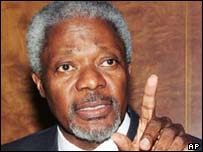Untitled Document
 |
The report will be presented
to Kofi Annan on 18 July |
A UN group charged with deciding how the net should be run has failed
to reach a decision.
The group's report suggests four possible futures for net governance that range
from no change to complete overhaul.
The proposals will go forward to a key UN net and society conference due to
take place in November.
The report comes as the US says it plans to keep its role as overseer of the
net's core administrative body.
Tough choice
The Working Group on Internet Governance (WGIG) was set up after delegates
to the UN's World Summit on the Information Society (WSIS) failed to agree on
how the net should be run.
Many of those attending the 2003 WSIS meeting in Geneva were happy with the
current system in which the Internet Corporation for Assigned Names and Numbers
(Icann) oversees the running of the net's addressing system.
Others, particularly delegates from developing nations, resent Icann's role
and the fact that the US has kept control of it.
Now the WGIG has issued its report about net governance and has tabled four
possible futures for what should be done about policy issues, such as spam and
hi-tech crime, that fall outside Icann's narrow technical remit.
Option One - create a UN body known as the Global Internet
Council that draws its members from governments and "other stakeholders"
and takes over the US oversight role of Icann.
Option Two - no changes apart from strengthening Icann's Governmental
Advisory Committee to become a forum for official debate on net issues.
Option Three - relegate Icann to a narrow technical role and
set up an International Internet Council that sits outside the UN. US loses
oversight of Icann.
Option Four - create three new bodies. One to take over from
Icann and look after the net's addressing system. One to be a debating chamber
for governments, businesses and the public; and one to co-ordinate work on "internet-related
public policy issues".
The one common aspect of all four proposals is the creation of some sort of
talking shop that will give governments and others a say in how the net develops.
The four proposals will be sent forward to the second World Summit on the Information
Society which is due to take place in Tunisia in November 2005 where delegates
will pick their favourite option.
Whatever decision the conference reaches could provoke a clash with the US
which in early July renewed its claim to oversee Icann's work.

